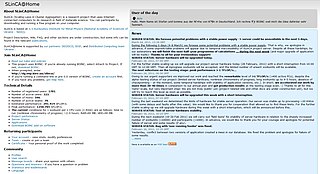Related Research Articles
Grid computing is the use of widely distributed computer resources to reach a common goal. A computing grid can be thought of as a distributed system with non-interactive workloads that involve many files. Grid computing is distinguished from conventional high-performance computing systems such as cluster computing in that grid computers have each node set to perform a different task/application. Grid computers also tend to be more heterogeneous and geographically dispersed than cluster computers. Although a single grid can be dedicated to a particular application, commonly a grid is used for a variety of purposes. Grids are often constructed with general-purpose grid middleware software libraries. Grid sizes can be quite large.

A light-weight Linux distribution is one that uses lower memory and/or has less processor-speed requirements than a more "feature-rich" Linux distribution. The lower demands on hardware ideally result in a more responsive machine, and/or allow devices with fewer system resources to be used productively. The lower memory and/or processor-speed requirements are achieved by avoiding software bloat, i.e. by leaving out features that are perceived to have little or no practical use or advantage, or for which there is no or low demand.

Budapest Honvéd Football Club, commonly known as Budapest Honvéd or simply Honvéd, is a Hungarian sports club based in Kispest, Budapest, with the colours of red and black. The club is best known for its football team. Honvéd means the Homeland Defence. Originally formed as Kispest AC, they became Kispest FC in 1926 before reverting to their original name in 1944.

Ferencvárosi Torna Club, commonly known as Ferencváros, Fradi, FTC is a Hungarian professional football club based in Ferencváros, Budapest, that competes in the Nemzeti Bajnokság I, the top flight of Hungarian football. Ferencváros was founded in 1899 by Ferenc Springer and a group of local residents of Budapest's ninth district, Ferencváros. Ferencváros is best known internationally for winning the 1964–65 edition of the Inter-Cities Fairs Cup after defeating Juventus 1–0 in Turin in the final. Ferencváros also reached the final in the same competition in 1968, when they lost to Leeds United, as well as the final in the 1974–75 season of the European Cup Winners' Cup, losing to Dynamo Kyiv.

The Hungarian Football Federation (HFF) is the governing body of football in Hungary. It organizes the Hungarian league and the Hungary national team. It is based in Budapest.

Zoltán Gera is a Hungarian former professional footballer who played as a midfielder for Fulham, Pécsi Mecsek and Harkány SE, as well as enjoying two spells at Ferencváros and West Bromwich Albion.

Zoltán Almási is a Hungarian chess player. Awarded the title Grandmaster by FIDE in 1993, he is a nine-time Hungarian champion, winning in 1995, 1997, 1999, 2000, 2003, 2006, 2008, 2009, and 2019.

In computing, a tiling window manager is a window manager with the organization of the screen often dependant on mathematical formulas to organise the windows into a non-overlapping frame. This is opposed to the more common approach used by stacking window managers, which allow the user to drag windows around, instead of windows snapping into a position. This allows for a different style of organization, although it strays from the traditional desktop metaphor.
An adaptive compliant wing is a wing which is flexible enough for aspects of its shape to be changed in flight. Flexible wings have a number of benefits. Conventional flight control mechanisms operate using hinges, resulting in disruptions to the airflow, vortices, and in some cases, separation of the airflow. These effects contribute to the drag of the aircraft, resulting in less efficiency and higher fuel costs. Flexible aerofoils can manipulate aerodynamic forces with less disruptions to the flow, resulting in less aerodynamic drag and improved fuel economy.
Digi Communications N.V., also known as DIGI Group, is a Romanian telecommunications holding company, which also has businesses in Spain, Italy, Portugal and Belgium. The firm has current statutory seat in the Netherlands and headquarters of effective management in Romania. Digi was founded by Zoltán Teszári, who is the majority shareholder, and has been listed on the Bucharest Stock Exchange since May 16, 2017.

Péter Kacsuk is a Hungarian computer scientist at MTA-SZTAKI, Budapest, Hungary.

Róbert Lovas is a Hungarian computer scientist at SZTAKI, Budapest, Hungary.

Fehérvár Football Club, is a Hungarian professional football club based in Székesfehérvár, which plays in the Nemzeti Bajnokság I, the top level of the Hungarian league system. Due to sponsorship reasons, the club changed its name from Videoton FC to MOL Vidi FC in 2018, the main sponsor of the club being oil and gas multinational company MOL. In 2019, the club changed its name once again to MOL Fehérvár FC.

SLinCA@Home was a research project that uses Internet-connected computers to do research in fields such as physics and materials science.
The Generic Grid-Grid (3G) Bridge is an open-source core job bridging component between different grid infrastructures. Its development started in 2008 within the CancerGrid and EDGeS projects. The aim was to create a generic bridge component that can be used in different grid interoperability scenarios. The 3G Bridge used within the EDGeS project that provides the core component of the Service Grid - Desktop Grid interoperability solution. 3G Bridge helps to connect user communities of different grid systems. For example, communities working on parameter sweep problems and using service grid infrastructures can migrate their applications to the more adequate desktop grid platform using the 3G Bridge technology, resulting in an accelerated research.

Hungarian nationalism developed in the late 18th century and early 19th century along the classic lines of scholarly interest leading to political nationalism and mass participation. In the 1790s, Hungarian nobles pushed for the adoption of Hungarian as the official language rather than Latin.

Manjaro is a free and open-source Linux distribution based on the Arch Linux operating system that has a focus on user-friendliness and accessibility. It uses a rolling release update model and Pacman as its package manager. It is developed mainly in Austria, France and Germany.

Zorin OS is a Linux distribution based on Ubuntu with both free and paid versions. It uses a GNOME 3 and XFCE 4 desktop environment by default, although the desktop is heavily customized for users more familiar with Windows and macOS.

Kata Csizér is a Hungarian linguist. She is currently a professor at the School of English and American Studies of the Faculty of Humanities of the Eötvös Loránd University, Hungary. Her research focuses on applied linguistics with a special focus on motivation in second-language learning and teaching students with special needs.
References
- ↑ Kacsuk, Peter; Kovacs, Jozsef; Farkas, Zoltan; Marosi, Attila Csaba; Gombas, Gabor; Balaton, Zoltan (2009-09-24). "SZTAKI Desktop Grid (SZDG): A Flexible and Scalable Desktop Grid System". Journal of Grid Computing. 7 (4): 439–461. doi:10.1007/s10723-009-9139-y. ISSN 1570-7873. S2CID 8783552. Archived from the original on 2022-08-14. Retrieved 2022-09-05.
- ↑ "SZTAKI Desktop Grid". Archived from the original on 2018-06-23. Retrieved 2005-11-27.